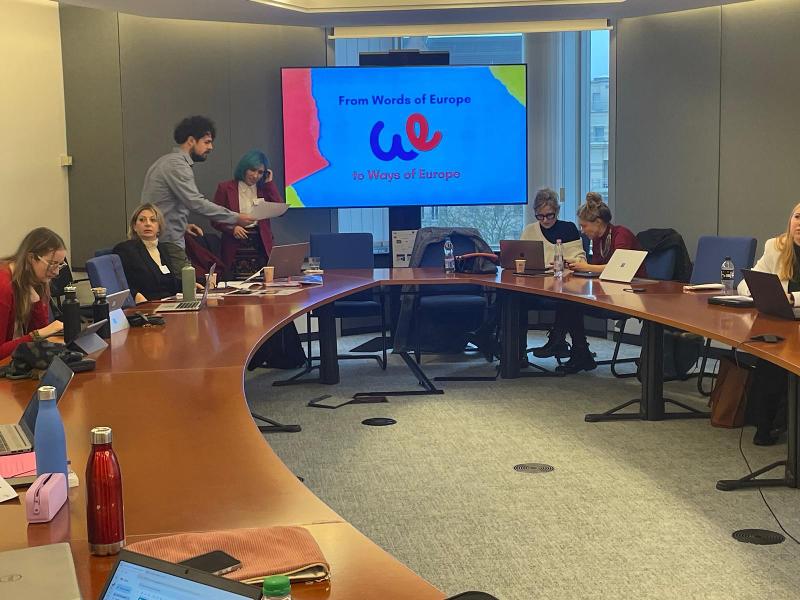"Ways of Europe" launches in Brussels. Building bridges for a more inclusive EU democracy
In Brussels, leaders and CSOs gathered to explore new ways of strengthening EU democracy through citizen engagement and inclusion.

Brussels, February 6, 2025 – Against the backdrop of an evolving political landscape and rising democratic challenges, the European Union finds itself at a critical juncture. This morning, policymakers, civil society representatives, and creative visionaries gathered in Brussels for Building Bridges for Europe’s Future, a dynamic event that sought to explore how the EU can reconnect with its citizens and foster more inclusive democratic processes.
Hosted in collaboration with MEP Benedetta Scuderi, the event bridged the achievements of the Words of Europe project with the ambitious goals of Ways of Europe. The discussions centered on fostering deeper, more meaningful participation in shaping the EU's future, particularly from voices often left unheard.
The Words of Europe initiative (2022-2024) took center stage as a pioneering project that reimagined how citizens engage with the European Union. By using art as a universal language, the project created a shared vocabulary of ideas, values, and aspirations. It particularly focused on underrepresented voices, transforming their reflections into creative expressions that emphasized inclusion and empowerment.
Select artworks from the project were showcased during the event, offering a poignant glimpse into the perspectives of marginalized communities. These creative pieces served not only as reflections of personal and communal struggles but also as catalysts for broader civic engagement.
At the heart of the event was a critical question: How can the EU foster meaningful participation, especially among those who feel excluded from the democratic process?
In recent years, Europe has witnessed a decline in public trust, a surge in political apathy, and the rise of extremist ideologies. This event underscored the urgent need to bridge the widening gap between citizens and institutions. Democracy, as emphasized throughout the discussions, must transcend being a mere procedural system; it needs to evolve into a dynamic, participatory process where all voices are heard, valued, and empowered.
The event kicked off with a reflective session led by various Civil Society Organizations (CSOs). This collaborative dialogue identified key challenges and opportunities for fostering meaningful participation across Europe. The session culminated in the finalization of the WE Ten-Point Statement, a set of recommendations aimed at enhancing citizen engagement in EU policymaking.
These recommendations were presented later in the day, serving as a foundational document for the discussions with MEPs and institutional representatives.
In her keynote address, MEP Benedetta Scuderi offered an institutional perspective on the EU's efforts to reconnect with its citizens. Her speech, “Inclusive Participation: The Path to a Stronger European Democracy,” highlighted the successes and lessons learned from initiatives like the Conference on the Future of Europe (CoFoE).
Scuderi stressed that for democracy to thrive, the EU must move beyond traditional frameworks and embrace innovative, participatory models that reflect the diverse realities of its citizens.
Representatives from a diverse array of CSOs shared their experiences and methodologies for engaging excluded and underrepresented communities. Speakers from Italy, Hungary, France, Spain, the Netherlands, and beyond showcased innovative grassroots practices that complement institutional efforts.
From UCCA’s cultural welfare initiatives in Italy to Fundació Privada Pere Closa’s participatory processes in Spanish neighborhoods, these stories illustrated the transformative power of local engagement in strengthening European democracy.
The final panel discussion brought together MEPs, CSOs, and participants to explore how institutional strategies and grassroots practices can align to create a stronger, united framework for citizen engagement. This interactive session encouraged audience participation, fostering a vibrant exchange of ideas and perspectives.
Key takeaways from the discussion included the importance of continuous dialogue between institutions and civil society, the need for accessible channels of participation, and the role of creative expression in amplifying marginalized voices.
As the event concluded, there was a palpable sense of momentum and optimism. The Building Bridges for Europe’s Future event served as more than just a platform for dialogue; it was a call to action. By weaving together institutional insights and grassroots innovations, the EU can pave the way for a more inclusive, connected, and democratic future.
The WE Ten-Point Statement will now move forward as a living document, guiding future collaborations between policymakers and civil society. As Europe navigates its complex political landscape, today’s event in Brussels stands as a testament to the power of collective vision and participatory democracy.


